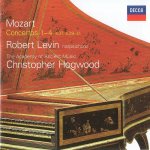This is a significant disc, not just for its performance values or for the excellence of its sound engineering, but also for Robert Levin’s absorbing and highly plausible solutions in these textually problematic early Mozart keyboard concertos. Mozart’s earliest “pasticcio” piano concertos, Nos. 1-4 (K. 37-41), are arrangements for keyboard and orchestra of sonata movements attributable to Raupach, Schobert, Honauer, Eckard, and C.P.E. Bach. Only the andante of Concerto No. 1 in F seems likely to have been written by Mozart himself. But as Cliff Eisen suggests in his booklet essay, “even as an 11-year-old in 1767, the idea of a concerto may have presented a thorny problem for him. . . It is fair to say that these are not Mozart’s concertos exclusively but rather a joint effort by father and son.” That leaves questions of just what was played, how it was played, and on which instrument. As Robert Levin writes, “we have discovered the importance of the original performing parts, which, more than the autograph manuscript, reveal what was actually played.” Levin discusses these aspects more deeply in his own note on performance and improvisation, but you’ll hear no cellos used here, following the custom in Salzburg at the time, and the chosen pitch is a’=430Hz.
But do Levin’s accounts satisfy musically as well as intellectually? The answer is emphatically “yes”: Mozart’s apprentice keyboard concertos never have been so well served on disc, and this release is superlative in every respect. What’s more, it fills a pressing need, since periodist rivals often by-pass these works, arguing that Mozart’s piano concerto canon begins where this collection ends. Hence Jos van Immerseel’s Channel Classics survey with Anima Eterna opens with Concerto No. 5 in D K. 175, Mozart’s earliest completely original concerto, as does Malcolm Bilson’s set with John Eliot Gardiner and the English Baroque Soloists on DG Archiv.
For comparison, I looked up Ingrid Haebler’s 1973 recordings on Philips, with the Vienna Capella Academica directed by Eduard Melkus, and Murray Perahia’s Sony performances with the English Chamber Orchestra. Not surprisingly, Haebler’s view isn’t that far removed from Perahia’s classically informed one, despite obvious differences in timbre and pitch with the former’s use of historic instruments. But in terms of articulation, ornamentation, tempo, and especially cadenzas, Robert Levin offers something entirely without precedent, playing a two-manual harpsichord. Thus the sound, and indeed the scale of his readings must mirror Mozart’s experience of these works quite accurately. Levin’s performances, delivered in breathtakingly vibrant, natural sound, are revelatory, and should be avidly sought by all dedicated Mozartians. [6/5/2001]
































